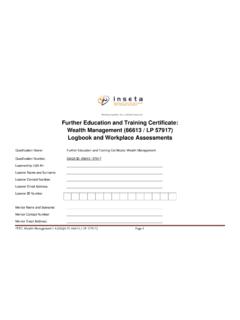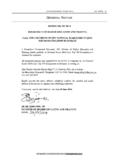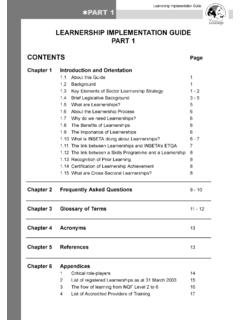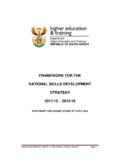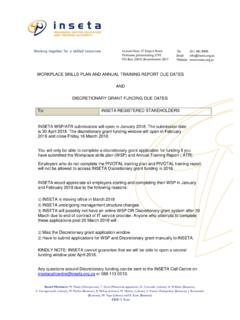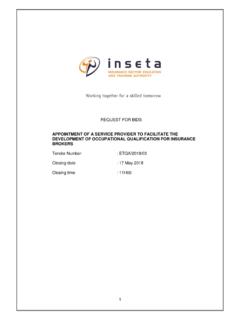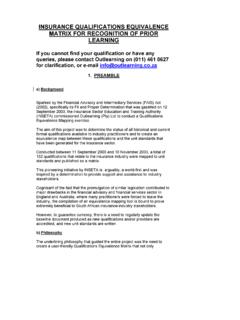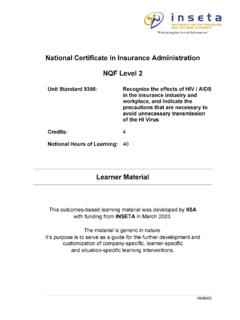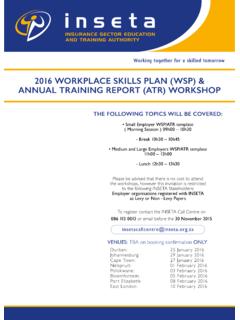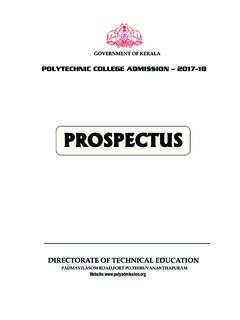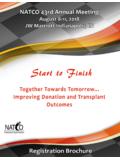Transcription of Bursary Guidelines for Employed - INSETA
1 LD/GL001/2017 Page 1 of 13 Bursary Guidelines for Employed Status: Approved Custodian: Learning Division Manager Approved: CEO Decision Date: 22 August 2017 Review Date: 22 August 2018 Version Number: LD/GL001/2017 Amendment Date: 24/07/2017 LD/GL001/2017 Page 2 of 13 Table of Contents Bursary Guidelines for Employed .. 1 Acronyms .. 3 1. Preamble .. 4 2. Grant Regulations .. 4 3. Discretionary Funds .. 5 4. Bursaries .. 6 5. Funding windows .. 6 6. Eligibility for Bursary funding .. 7 Employers: .. 7 Students: .. 7 7. INSETA Bursary Grant Approval .. 8 8. Payment of Bursary Funds to the Employer .. 8 Employers .. 11 Students .. 12 11. Application .. 13 12. Review .. 13 LD/GL001/2017 Page 3 of 13 Acronyms ATR Annual Training Report FET Further education and Training INSETA Insurance Sector of education Training Authority NSDS National Skills Development Strategy PIVOTAL Professional, vocational, technical and academic learning programmes QCTO SDA SDL Quality Council for Trades and Occupations Skills development Act Skills Development Levies Act SETA Sector education and Training Authorities SSP TVET Sector Skills Plan Technical and Vocational education and Training Colleges WIL Work Integrated Learning WSP Work Skills Plan LD/GL001/2017 Page 4 of 13 1.
2 Preamble The Insurance Sector education Training Authority ( INSETA s) purpose is to grow the pool and quality of scarce and critical skills in the insurance and related services sector, enhancing the sector and supporting the country s transformation. The Skills Development Act and the Skills Development Levies Act provide for the collection of levies from employers in the insurance and related services sector and provides directives and/or Guidelines on how the funds allocated to each SETA should be disbursed. To outline the process and requirements for applying for bursaries the INSETA Learning Division has therefore drafted a formal Bursary Guideline for persons Employed in the Insurance and related services sector This guideline document should be used for reference, understanding and compliance by all applicants for Bursary funding. 2. Grant Regulations On 3 December 2012, revised Grant Regulations were gazetted, which impacted on the allocation of SETA funding.
3 The intent of the new regulation is to, amongst others: (adapted from Government Gazette no. 34932): Regulate the proportion of funds available for skills development that is spent on administration costs Regulate the proportion of discretionary funds available for skills development Improve the quantity and quality of labour market information received by SETAs through Workplace Skills Plans (WSP), Annual Training Reports (ATR) and PIVOTAL Training Reports, which provide a reflection of skills needs and inform planning. LD/GL001/2017 Page 5 of 13 Promote PIVOTAL 1programs, which are NQF-registered and quality assured, towards addressing priority scarce and critical skills needs in the sector, as identified through Sector Skills Plans (SSP s) and research. In response, the INSETA drafted a reviewed Discretionary Grant Funding Policy that was approved by the INSETA Board and is updated annually The discretionary project expenditure increases from 20% to 80% of Discretionary funding has to be allocated to PIVOTAL programmes.
4 3. Discretionary Funds The Discretionary funds allocation allows the INSETA to exercise discretion in relation to how discretionary grants are utilised towards implementation of the sector skills plan and strategic objectives. The priority focus is on meeting the scarce and critical skills needs of the sector and closing the gap between labour market needs and skills supply. INSETA will be guided by the following national priorities in the allocation of its discretionary funds: National strategic goals as set out in the NSDS III, the INSETA strategic plan and annual performance plan and other national priorities as relevant. Disbursement of discretionary grant funding aims to: Address the scarce and critical skills needs of the sector as identified through the SSP and other relevant research Promote full qualifications addressing scarce and critical skills Focus on PIVOTAL programmes that meet the essential needs of the labour market 1 According to regulations, PIVOTAL is an acronym which means professional, vocational, technical and academic learning programmes that result in qualifications or part qualifications on the NQF as contemplated in regulation 3(6) and (7) as read with regulation 6(11) to (15) (taken from Government Gazette No.)
5 35940). LD/GL001/2017 Page 6 of 13 Encourage structured practical and WIL within programmes as a priority and ensure that mechanisms are put in place for monitoring workplace learning; and Develop public FET institutions to deliver INSETA occupational qualifications 4. Bursaries INSETA will support the development of scarce and critical skills through Bursaries to Employed students with a view to: Addressing the scarce and critical skills as identified in the SSP Promoting the developmental and transformational imperatives of NSDS lll Increasing the professionalism of the sector INSETA will allocate Bursaries for studies at NQF level 5 to 10 at Public Higher education Learning Institutions. Private Higher education Institution tuition will be considered at INSETA s discretion INSETA will fund Bursary programmes via the employer but may through agreement with learning institutions, pay bursaries directly to the learning institutions.
6 5. Funding windows Bursary funding will only be allocated through funding windows opened at the discretion of INSETA . INSETA may consider late applications on first come, first- serve basis, subject to the following Availability of funding Commencement of programmes within the financial year Funding windows will be announced via the INSETA website. The INSETA call-centre and other mechanisms of communication may be used at the discretion of INSETA . LD/GL001/2017 Page 7 of 13 6. Eligibility for Bursary funding Employers: INSETA will support levy-paying and non-levy paying employers (confirmed as uniquely registered with INSETA ) operating in the Insurance and related services sector INSETA will only support employers who have submitted the WSP/ATR and PIVOTAL reports as required In the event of non-performance by any party funded by INSETA in terms of the learning programme all further funding will be withheld until an investigation is completed Employers found to be non-compliant in past implementation of INSETA funded programmes will not be considered for funding unless evidence of remediation to the satisfaction of INSETA can be produced Students.
7 Employed students must be South African citizens or be permanently Employed by an INSETA registered employer within the Insurance and related services sector A student may not be on more than one INSETA funded programme within a 12 month period Students that previously exited an INSETA - funded programme prior to completion will not be considered unless special representation has been made by the employer. Approvals are at the discretion of INSETA Students are subject to the terms and conditions of the contract of employment entered into with the employer and the performance requirements of the learning programme and curriculum. These terms and conditions must be aligned to the INSETA Bursary Guidelines LD/GL001/2017 Page 8 of 13 7. INSETA Bursary Grant Approval Application Process: Employers will be expected to apply online during the application window for studies or proposed studies for the following academic year Application may only be made for future registration and no retrospective approvals will be processed Recommendations and approvals will be considered against the registration status of the company with INSETA , previous implementation of INSETA funded programmes, budget availability as well as the submission of statutory reporting required by INSETA (WSP and ATR).
8 Approval Process: INSETA commits to a 3 months turnaround time from close of funding window to approve, reject or query a Bursary Grant Application. Upon completion of evaluation, INSETA will advise the applicant on approval or rejection in writing. Where INSETA has a query and requests outstanding documents, these must be provided within 5 working days failing which the application will be declined and returned to the applicant. INSETA will allocate a unique Bursaries Fund Allocation (BFA) number for all bursaries approved and this will be provided to the Applicant Company or institution with whom INSETA has agreement for reference purpose. 8. Payment of Bursary Funds to the Employer In terms of payments INSETA will be liable to pay the full amount of the qualification (up to the prescribed maximum) subject to the following conditions being met: i. Subject to all Required Documents are received by the agreed date ii. Payment will not be made unless INSETA has given prior approval in writing to the applicants approving the bursaries.
9 LD/GL001/2017 Page 9 of 13 iii. No person or entity is entitled to commit INSETA financially or otherwise outside of this guideline, unless they have received INSETA authorisation in writing. iv. It is expected that the employer correctly identifies students for bursaries in accordance with the development plan for the employee. This will ensure that students who attend training are capable of achieving the qualification / credits. v. The employer will be responsible to refund INSETA in full, all associated Bursary payments made where a student is unable to attend or complete the qualification or component thereof as registered for, within the funding year. vi. Any employee who does not complete the learning components as registered, will not be eligible to receive further funding until they complete the learning for which they have been funded. vii. At least 50% of registered modules are passed if a student has registered for 4 modules and passed two then fees will be covered a.
10 However, INSETA will not pay for the same modules twice, if the student fails the registered modules he or she will have to re-register and pass the modules before he or she can receive further funds. viii. Bursaries for the next level of study will be granted on successful completion of at least 50% subjects in each study level If a student registered for 3 modules in the 1st semester and only is competent in 1 module and failed only 1 and did not complete the other they will not receive further funding ix. If a student fails or did not complete all the modules registered for in the 1st semester INSETA will not fund him or her in the following semester x. Where a student on a funded programme resigns from his / her employment, he is entitled to continue with the already funded learning as long as they remain in the employment of a registered INSETA employer. LD/GL001/2017 Page 10 of 13 xi. Any reimbursement of INSETA Bursary funding by the employer from the student must be refunded to INSETA in full.
